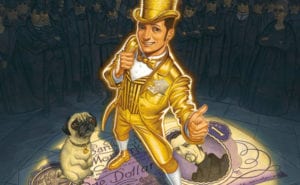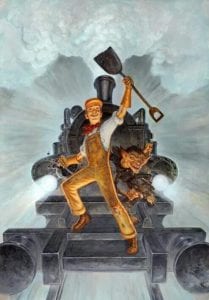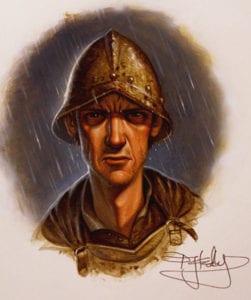Greetings, readers of the Fandomentals. Today, I will discuss an author we don’t see often on our site: Terry Pratchett. The late Sir Terry is a very important writer to me. I read his first book when I was 16, and devoured the entire Discworld cycle (as it was back then) in a couple of years afterwards. Pratchett’s singular wit, cynical observation of reality and relentless dissection of the fantasy genre influenced the way I see fiction tremendously.
So why haven’t I written anything about him yet? Perhaps I felt I’d said all I had to say when I defended my Master’s thesis on him three years ago. But that thesis was on a very specific subject—analyzing the original corpus and Piotr Cholewa’s fine Polish translations (as well as a few done by another translator) using computational stylistics.
The corpus didn’t include Raising Steam and Shepherd’s Crown, as they hadn’t been translated into Polish yet when I began my work. Recently, I decided I owed it to Pratchett to read his final works, and purchased Raising Steam. I was expecting a dip in quality, but nothing could prepare me for what it actually was.
In Brief
Raising Steam, as the name implies, deals with the advent of the steam engine into the Discworld. Which had until then been a strange mixture of a fairly modern society with a decidedly preindustrial technology. The inventor of this new engine is a callback to Reaper Man. Ned Simnel, who appears there with an experimental machine that doesn’t take off, is his father. He died in a workshop accident, but his son continued his work.
That’s a fairly innocuous callback, one that dedicated readers will notice and appreciate. Unfortunately, not all of them are so innocuous. Discworld has always been a series you could read out of order. The books followed several different locations and groups of characters, who had only slight connections to one another. Each book also introduced its characters in a smooth and clear way. As the series progressed, though, this became harder, particularly in the Ankh-Morpork setting. Raising Steam is the culmination of this, as its plot proceeds directly from books like Snuff and Thud!, while also referencing Fifth Elephant. Someone who hasn’t read those books will find certain things confusing.
Either way, the steam engine makes its way into Ankh-Morpork, where everything seems to end up sooner or later. The way the city acts as the single most important location in the Disc has honestly gotten past the point of pastiche for me. The books have been self-aware about making it the central position for a while now, but it’s not enough anymore.
Needless to say, the new invention makes a splash. People are afraid and apprehensive, but they also see the opportunities. Lord Vetinari assigns Moist von Lipwig, the unfortunately-named protagonist of Going Postal and Making Money, to make sure everything runs smoothly. Or else, of course. The business magnate Harry King decides to finance the whole operation.

The other plot, running concurrently, is the progressing social schism and radicalization among dwarfs. After the Koom Valley Accord, trolls are no longer their mortal enemy, but it’s not so easy to convince the conservative elements about that. The reactionary grags preach and many dwarfs get violent. They take to attacking clacks towers and the railway also offends them. Not for any particular reason… they just really hate that it exists.
The two plots converge when a hyper-reactionary grag stages a coup while the Low King of the Dwarfs (actually the low Queen of the dwarfs, but more on that later) is in Ankh-Morpork. Thus, the only way for her to get back to her capital quickly enough is to build a railway to Uberwald. And so the game is on.
The Steam…Falls
That’s about it for a relatively spoiler-free plot summary. The main themes of the book are modernity versus conservatism, as well as change and progress. Those themes had run through Discworld for much of its last parts. But just as Raising Steam is their culmination, so is it the culmination of the troubles that had plagued them.
The main message of the dwarfish subplot isn’t really something we can argue about. Racism and religious fanaticism are bad, peace and tolerance are good. But, well, that’s just it. That sentence summarizes that subplot, more or less. Pratchett had always skewered racism, xenophobia, and fear of change, but he’s always done it with wit. With intelligence.
Raising Steam lacks those. The discussion about racism has been infantilized. The conservative dwarfs say hateful things. People refute them. And that’s about it, for the whole novel. Dwarfs seem to be the last bastion of racism in Discworld, incidentally—we see no xenophobic humans, trolls, or goblins.
The goblins feature prominently in Raising Steam, following the events of Snuff, where every nation on Disc unilaterally granted them full rights and protections within the law. In a single day. Now the little folk are working on the clacks system, having an innate knack for machinery. They take to the railway quickly. Everyone always says that they’re weird and smelly, but good workers.
All of it feels… nice. Too nice. The issues of racism, ingrained prejudice, and people who lash out because they feel like the world has left them behind are dealt with using platitudes. We see dwarves spew hate and prejudice, and then we see feel-good stories about people getting along. This is certainly inspiring, in a way, especially in today’s atmosphere. But did we need a whole novel full of it?
P ratchett had always had a way of mixing profound cynicism and biting satire on human nature with an ultimately hopeful message. People are petty, cruel, stupid, and unimaginative. They call their stubborn refusal to accept anything outside their comfort zone “common sense”. But for all that, they can do better. And yet, even if they do, those ugly traits aren’t going anywhere.
ratchett had always had a way of mixing profound cynicism and biting satire on human nature with an ultimately hopeful message. People are petty, cruel, stupid, and unimaginative. They call their stubborn refusal to accept anything outside their comfort zone “common sense”. But for all that, they can do better. And yet, even if they do, those ugly traits aren’t going anywhere.
Raising Steam, once again, lacks that. Good people are good and bad people are bad. There had always been villains in Discworld and they usually didn’t have a good reason for their actions. But the people who opposed them had always been flawed and the society at large might or might not support them. Most likely it will not distinguish between them, get bored, and forget about it after a week.
Harry King, in particular, had always appeared as a morally ambiguous character in previous books. He was ruthless and brutal, having had to claw his way up from the gutter. He did right by people loyal to him, but dealt with opposition without mercy. Raising Steam largely glosses over his more sinister traits, explaining such changes as a result of his getting older and wanting to be respectable.
Which isn’t entirely a criticism of said society, I should mention. A recurring theme of Discworld is that among all the equally tense and funny plots we follow, life goes on. And someone’s going to have to go clean the streets, deliver food, and sell shoes after everything is over and the heroes have moved on to the next big thing.
You can still feel this in Raising Steam, but it’s faint. On the whole, there’s just a lot of good people and some bad ones. The bad ones approach cardboard cutouts in their portrayal. Not even because of how hateful they are. I found that all too believable, sadly. But they’re not very threatening. Neither physically nor ideologically. Yes, they corrupt and convert dwarfs to their cause, but whenever they actually clash with the heroes…they mostly fold without too much effort. Both physically and psychologically.
A part of the dwarfish conflict is, like I mentioned, the fact that the Low King is actually a Queen. Now, the issue of dwarfish gender had come up before. Their society is unisexually male, so to speak—a dwarf is male by default. The fact that half of them aren’t actually male is something private. There’s very little physical difference between dwarfish sexes, of course, with all of them being stocky, having prodigious beards, and wearing layers of mail and leather.
The slow change of that status quo began with Cheri Littlebottom, a City Watch member. Which of course wasn’t easy, since wearing a knee-length heavy leather skirt and some makeup was seen as the height of depravity. Raising Steam culminates this plot by confirming that the Low Queen is actually a woman, which she proclaims far and wide in the climax.
I’m hesitant to pass judgments on this subject, since I’m not personally invested in it (not being a woman myself). But it doesn’t feel satisfying. A conflict about challenging deeply-ingrained societal norms is solved by someone getting on a podium and telling it like it is. Some dwarfs grumble, but get over it. It feels anticlimactic. Maybe it landed for others, who have a personal connection to the matter, but it didn’t for me.
The second plot is that of the railway. It’s very reminiscent of some previous Discworld books, where the city of Ankh-Morpork was introduced to the modern mail, banking, or newspapers. There’s confusion, but then everyone adopts it as the new normal. More than normal, really. Everybody loves the railway, apart from some crusty holdovers and people who want more of the profit. And that’s just it, really. Everyone loves the railway and everyone agrees that the reactionary dwarves are bad. So all it takes is to lay down the tracks and wallop the bad dwarfs—who are coded to be remarkably similar to religious terrorists—properly. Any problems that appear are summarily handled without much tension.
The largest threat to the railway is, perhaps, when two children almost die while pressing their ears to the train tracks. Moist risks his life to save them and points out that allowing for something like that to happen would have ended the project right there and then. But instead people hail him as a hero for rescuing two kiddies and everything proceeds as planned.
The book tries to talk about the nature of societal and technological change, but the efforts are fairly half-hearted. Lu-Tze, the history monk who had appeared several times before, comes to talk to Archchancellor Mustrum Ridcully about his fellow monks’ concerns. They’re not sure if now is the time for the steam engine to arrive. The monk and the wizard however agree that if the steam engine has arrived then it clearly is steam engine time. Just one more problem introduced and dealt with in a single scene.
The other problems that could arise from rapid industrialization and building an entire railway network in a matter of months just  don’t really crop up. Everyone is eager to work on the railway and everyone gets their fair shake if they want it. The issues of monopolies, exploitation of the workforcem and land-grabbing are absent, because everyone responsible for it is honest and on the level.
don’t really crop up. Everyone is eager to work on the railway and everyone gets their fair shake if they want it. The issues of monopolies, exploitation of the workforcem and land-grabbing are absent, because everyone responsible for it is honest and on the level.
Is it Weird to Say it’s Too Nice?
It all really feels like an inexperienced writer’s attempt at dealing with serious issues. Thus the oversimplification and lack of any real tension and conflict. But a fresh writer’s book wouldn’t feel so crowded. Everyone who is someone in Ankh-Morpork (and sometimes beyond) has to make an appearance. Moist von Lipwig, Vetinari, Sam Vimes… the cameo from Lu-Tze as well. Pratchett has said once that if anything ends Discworld, it’s overcrowding. That’s not how it happened, sadly, but it was still true of this book.
And these characters don’t really feel like themselves. They’re little more than their basic traits, distilled and put on the page. Like a dialogue between TVTropes pages instead of fleshed out people. It contributes to the general feeling of a lack of tension. Vimes even comes to respect Moist, which is… once again, too nice.
“Too nice” sums up the whole book, I’m afraid. It’s not really about anything. Just things happening; what the hell, to paraphrase the great philosopher Didactylos. Pratchett clearly had things he wanted to bring into Discworld before it ended, and this was his way of introducing them. But whatever his plan was didn’t work out well. I know why that was, and I understand why he may have been desperate to get these things onto the page. But it’s still not the Discworld I know and love. It’s like Discworld written by someone else, someone who doesn’t understand what made it so special.

